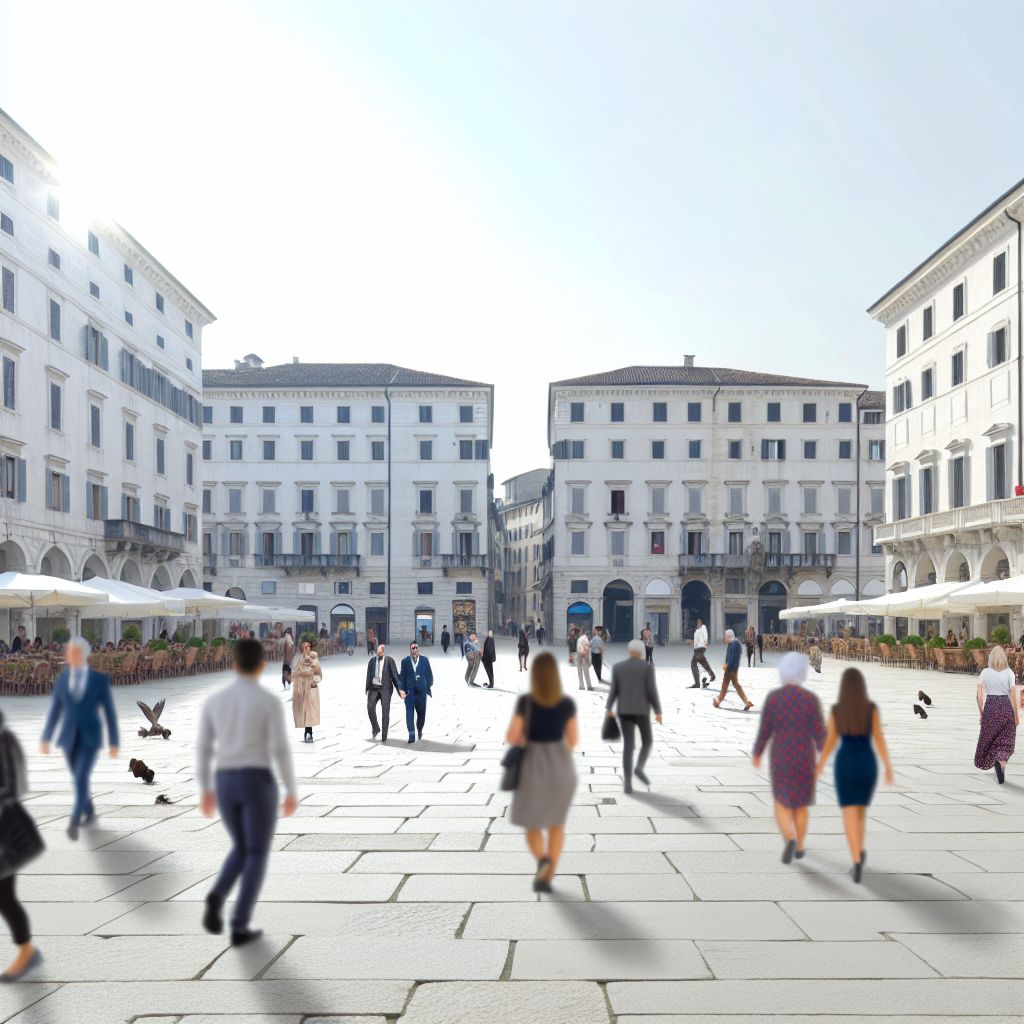Deutsch: Platz / Español: Plaza / Português: Praça / Français: Place / Italiano: Piazza
Piazza in the travel context refers to a public square or marketplace at the heart of an Italian city or town, which is often surrounded by significant architectural and cultural landmarks. These open spaces are pivotal communal areas where social, cultural, and commercial activities converge, making them essential stops for any traveler exploring Italian urban landscapes.
Description

Piazzas are integral to the urban planning of Italian cities and are characterized by their open space and the communal atmosphere they foster. Historically, these squares have served various purposes, from marketplaces to meeting places for public discourse and celebrations. Each piazza in Italy tells its own story, often lined with historic buildings, churches, and monuments that reflect the architectural and cultural evolution of the area.
Travelers to Italy often find piazzas to be lively hubs of activity where they can observe local life, partake in public events, or simply relax at a café and enjoy the surrounding views. Notable examples include Piazza San Marco in Venice, known for its breathtaking architecture and historical significance, and Piazza del Campo in Siena, famous for hosting the Palio horse race.
Application Areas
Piazzas are prominent in several travel-related contexts:
- Cultural Tourism: Exploring historic squares to learn about their history and architecture.
- Social Interactions: Participating in local festivals and public gatherings often held in these squares.
- Culinary Experiences: Many piazzas are lined with cafes and restaurants offering local cuisine, providing a taste of regional flavors in an open, social setting.
- Photography and Art: The aesthetic and historical appeal of piazzas makes them popular subjects for photography and artistic representation.
Well-Known Examples
Some of the most famous piazzas include:
- Piazza San Marco (St. Mark’s Square), Venice: Home to the majestic Basilica di San Marco and the Doge’s Palace, it is often described as one of Europe’s most elegant squares.
- Piazza del Campo, Siena: Known for its distinctive fan shape and medieval architecture, it is one of the most recognized medieval squares in Europe.
- Piazza Navona, Rome: Built on the site of a 1st-century stadium, this oval-shaped square is famous for its Baroque Roman architecture and three beautiful fountains.
- Piazza della Signoria, Florence: A symbol of Florentine power and politics, surrounded by historic buildings and sculptures.
Treatment and Risks
Visiting piazzas is typically safe, offering a pleasant way to enjoy the open air and vibrant street life of Italian cities. However, travelers should be mindful of pickpockets, especially in crowded and tourist-heavy piazzas. It is also wise to check the local dining prices as these areas can sometimes feature higher costs due to their popularity and central Location.
Similar Terms
- Plaza: The Spanish equivalent of a piazza, central to community life in Spanish-speaking countries.
- Square: A general term used internationally to describe an open public space similar to a piazza.
- Forum: In ancient Roman cities, the forum served a similar purpose to the piazza as a public square and marketplace.
Articles with 'Piazza' in the title
- Cathedral, Torre Civica and Piazza Grande, Modena: The Cathedral, Torre Civica and Piazza Grande, Modena is a World Heritage site in Italy defined by the UNESCO in 1997 and definitely a recommended cultural sightseeing location
Summary
In Italy, a piazza is not just a public square; it is a cultural cornerstone that offers insights into the life and history of its city. Whether used for social gatherings, markets, or simply as a place to relax and soak in the atmosphere, the piazza is a vital part of the Italian urban landscape and a must-visit for any traveler to Italy.
--
Related Articles to the term 'Piazza' | |
| 'Plaza' | ■■■■■■■■■■ |
| Plaza in the context of travel refers to an open public space found in cities and towns, often serving . . . Read More | |
| 'AYR' | ■■■■■■■■■ |
| Ayr is a town on the southwest coast of Scotland, known for its picturesque landscapes, historical significance, . . . Read More | |
| 'Territory' at psychology-lexicon.com | ■■■■■■■■ |
| In the context of psychology, territory refers to the concept of an area or space that an individual . . . Read More | |
| 'Obligation' at psychology-lexicon.com | ■■■■■■■ |
| Obligation in the Psychology Context: Understanding Commitments, Guilt, and MotivationIn psychology, . . . Read More | |
| 'Arrecife/Lanzarote' | ■■■■■■■ |
| Arrecife/Lanzarote: Arrecife is the capital of Lanzarote, one of the Canary Islands in Spain, located . . . Read More | |
| 'Community' at top500.de | ■■■■■■■ |
| Community refers to a group of individuals or organizations with shared interests, goals, or geographic . . . Read More | |
| 'Atmosphere' | ■■■■■■■ |
| Atmosphere in the context of travel refers to the overall feeling, mood, or character of a place that . . . Read More | |
| 'Moisture' | ■■■■■■■ |
| Moisture in the travel context refers to the presence of Water or humidity in the environment, which . . . Read More | |
| 'Setup' at quality-database.eu | ■■■■■■■ |
| Setup in the quality management context refers to the preparation, configuration, or organisation of . . . Read More | |
| 'Siena' | ■■■■■■ |
| Siena in the context of travel refers to a historic city in the Tuscany region of Italy, renowned for . . . Read More | |
